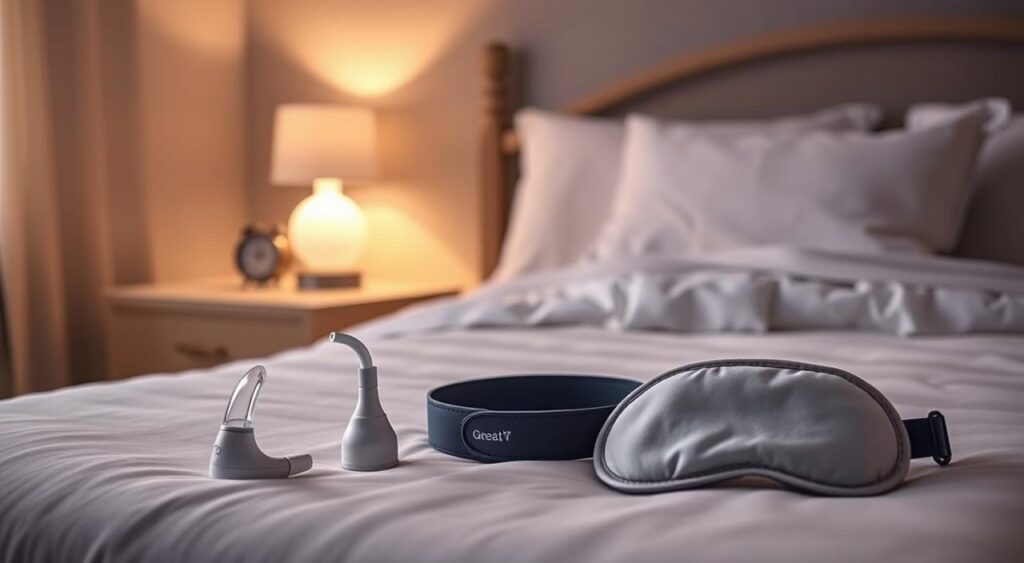Did you know nearly half of all adults snore regularly? This sleep disorder affects millions, disrupting their sleep and their partners’. Snoring is not just a bother. It can signal serious health problems and long-term risks if ignored.
This guide offers expert advice on stopping snoring and better sleep. It explains the science behind snoring, its health risks, and effective solutions. Whether you snore often or just want better sleep, this article has you covered.

Key Takeaways
- Snoring affects nearly half of all adults, often disrupting sleep quality
- Snoring can be an indicator of serious health issues and poses long-term risks if left untreated
- This guide covers the science behind snoring, health risks, and a wide range of effective solutions
- Readers will learn about lifestyle changes, medical treatments, and natural remedies to address snoring
- The goal is to help readers achieve more restful and peaceful sleep
Understanding the Science Behind Snoring
Snoring is more than just a nighttime noise. It’s a sign of something deeper going on. By looking into the science, we can find better ways to stop it. We’ll explore how sleep position and breathing patterns play a role in snoring.
Common Anatomical Causes of Snoring
Snoring happens when the throat muscles relax during sleep. This lets the soft tissues in the throat block the airway. Sleep apnea can make this blockage worse, causing even more severe snoring.
How Sleep Position Affects Snoring
Your sleep position can make snoring better or worse. Sleeping on your back can make snoring worse because your tongue and soft tissues block the airway. But sleeping on your side or slightly raised can help keep the airway open.
The Role of Breathing Patterns
- Irregular breathing, like mouth breathing, can make snoring worse by reducing air flow.
- Nasal congestion or a deviated septum can also make breathing harder, leading to more snoring.
- Fixing these breathing issues is key to finding good snore solutions.
Understanding how anatomy, sleep position, and breathing patterns interact can help us tackle snoring. This knowledge can lead to better sleep for everyone.
Health Risks Associated With Chronic Snoring
Chronic snoring is more than just annoying. It can lead to serious health issues. People who snore a lot might have sleep apnea, a disorder that stops breathing at night.
Sleep apnea can cause heart problems like high blood pressure and heart disease. It can also lead to stroke. It makes you tired during the day and can hurt your brain and increase accident risks.
Chronic snoring is also linked to other health problems. These include GERD, hormonal imbalances, and a higher risk of type 2 diabetes. If not treated, these can greatly affect your health and life quality.
| Health Condition | Connection to Chronic Snoring |
|---|---|
| Sleep Apnea | Repeated breathing interruptions during sleep |
| Cardiovascular Problems | High blood pressure, heart disease, stroke |
| Daytime Fatigue | Lack of quality sleep |
| GERD | Throat and airway irritation |
| Type 2 Diabetes | Hormonal imbalances and inflammation |
Fortunately, many health risks can be managed or prevented by treating snoring. We’ll look at lifestyle changes and medical options to reduce snoring and improve health.
“Chronic snoring is not just a nuisance – it can have a significant impact on your health. Addressing the problem early on is crucial to preventing more serious complications.”
Lifestyle Changes to Reduce Snoring
If you’re struggling with snoring, making lifestyle changes can help a lot. You can manage your weight, exercise, and sleep better. These changes can reduce snoring and improve your sleep.
Weight Management and Exercise
Keeping a healthy weight is key to managing snoring. Extra weight, especially around the neck, can block your airway and make you snore more. Regular exercise helps you lose weight and tone muscles, improving breathing at night. Try to do at least 30 minutes of moderate exercise, like brisk walking or swimming, most days.
Sleep Schedule Optimization
Having a regular sleep schedule is important. Try to go to bed and wake up at the same time every day. This helps your body’s internal clock and can make your sleep better, reducing snoring.
Dietary Modifications
- Limit alcohol, as it relaxes throat muscles and can make snoring worse.
- Avoid heavy, fatty, or spicy meals before bed to prevent digestive issues that can worsen snoring.
- Drink plenty of water to stay hydrated, as dehydration can thicken mucus and make snoring worse.
By changing your lifestyle, you can reduce snoring and sleep better. Remember, it takes time and consistency to see results.
| Lifestyle Change | Impact on Snoring |
|---|---|
| Weight Management and Exercise | Reduces excess weight around the neck and throat, improving airway flow and reducing snoring |
| Sleep Schedule Optimization | Regulates the body’s internal clock, leading to better quality sleep and reduced snoring episodes |
| Dietary Modifications | Limits alcohol consumption, avoids heavy meals before bed, and stays hydrated, all of which can help reduce snoring |

“Making lifestyle changes is one of the most effective ways to reduce snoring and improve overall sleep quality. By addressing factors like weight, sleep schedule, and diet, you can take control of your snoring and enjoy better, more restful nights.”
Medical Solutions and Professional Treatment Options
For those dealing with persistent or severe snoring, medical help might be needed. This section looks at different professional treatments. These include sleep studies, surgeries, and CPAP machines for sleep apnea and snoring.
Sleep Studies and Diagnosis
Snoring with symptoms like daytime tiredness or waking up often might mean sleep apnea. A sleep study in a lab can find the cause. It helps choose the right treatment.
Surgical Interventions
Some people might need surgery for snoring. This could be removing throat tissue or nasal surgery. Always talk to a doctor before deciding on surgery.
CPAP Machines for Sleep Apnea
CPAP machines are a top choice for sleep apnea. They keep airways open for better breathing at night. This can greatly improve sleep for those with sleep apnea.
| Treatment Option | Description | Efficacy |
|---|---|---|
| Sleep Studies | Comprehensive evaluation of sleep patterns and breathing issues | Essential for accurate diagnosis of underlying conditions |
| Surgical Interventions | Procedures to remove excess tissue and improve airflow | Effective for some individuals, but carries surgical risks |
| CPAP Machines | Devices that deliver a steady flow of air to keep airways open | Highly effective for managing sleep apnea and reducing snoring |
Knowing about medical solutions and treatments can help those with chronic snoring. They can work with doctors to find the best way to improve their sleep and health.
Anti-Snoring Devices and Their Effectiveness
Anti-snoring devices help those who snore a lot. They improve sleep quality and health. These tools target snoring causes, offering relief and better rest.
CPAP Machines and Their Benefits
CPAP machines are a top pick for snoring and sleep apnea. They use air pressure to keep airways open. This stops snoring vibrations.
Studies show CPAP machines reduce snoring and boost energy. They lead to better health overall.
Dental Appliances and Mouth Guards
Dental appliances and mouth guards are effective too. They fit your mouth and keep airways open. This stops snoring.
Research backs their success in cutting down snoring. They help you sleep better.
Nasal Strips and External Aids
Nasal strips help if snoring is due to nasal issues. They lift nostrils, improving airflow. This reduces snoring.
While not as strong as CPAP or dental devices, they’re easy and affordable. They’re a good start for some.
| Anti-Snoring Device | Key Benefits | Effectiveness |
|---|---|---|
| CPAP Machines | Improves sleep quality, reduces sleep apnea | Highly effective |
| Dental Appliances | Repositions jaw and tongue, opens airway | Highly effective |
| Nasal Strips | Increases nasal airflow, reduces nasal congestion | Moderately effective |

Choosing the right anti-snoring device is key. Think about your needs and snoring causes. A doctor’s advice can guide you to the best choice.
Natural Remedies and Alternative Treatments
Looking for ways to stop snoring without surgery? There are many natural remedies and alternative treatments that can help. These include herbal supplements and essential oils that aim to fix the root causes of snoring. They also help improve sleep hygiene.
Herbal Remedies for Snoring
Herbs like valerian root and chamomile can relax you and loosen throat muscles. This can help reduce snoring. Adding these herbs to your daily routine might ease your snoring.
Essential Oils for Better Sleep
Essential oils like lavender, peppermint, and eucalyptus can also help. They can be used in aromatherapy to calm the nasal and throat areas. This can lead to a quieter night’s sleep.
Throat Exercises and Muscle Strengthening
Doing specific exercises for your throat and tongue can strengthen muscles. This can prevent the soft tissues from collapsing and causing snoring. Regular practice can improve your snoring over time.
Relaxation Techniques for Better Sleep Hygiene
Techniques like meditation, deep breathing, and progressive muscle relaxation can also help. They reduce stress and tension, which often lead to snoring. These practices can make your sleep more restful and restorative.
While natural remedies and alternative treatments might not solve chronic snoring, they can be great additions. They can enhance sleep quality and address snoring’s underlying causes.
Sleep Position Techniques to Stop Snoring
Snoring can be a big problem for both the person snoring and their partner. But, there are ways to stop it and sleep better. Let’s look at some good strategies to help you sleep well.
Side Sleeping Benefits
Sleeping on your side is a great way to stop snoring. When you sleep on your back, your tongue and soft palate can block your airway. This causes snoring. Sleeping on your side keeps your airway open and helps you breathe better.
Pillow Positioning Strategies
The way you place your pillow can affect your breathing at night. Choose a pillow that supports your head and neck without being too thick. This helps keep your chin from falling, which can cause snoring.
Bed Adjustments for Better Breathing
- Elevate the head of your bed by 4-6 inches to keep your airways open and improve airflow.
- Use a body pillow or wedge pillow to prop yourself up on your side, maintaining a comfortable sleeping position.
- Consider investing in an adjustable bed that allows you to raise the head of the bed to find the optimal sleeping angle.
Trying out these sleep position techniques can help you stop snoring and sleep better. It might take some time to find what works best for you. But, the good sleep you’ll get is worth it.
When to Seek Professional Help for Snoring
Many snoring problems can be solved on your own. But, some need a doctor’s help. Knowing when to see a healthcare provider or sleep specialist is key.
If you snore a lot and feel very tired during the day, it might be sleep apnea. This is a serious sleep disorder. It can cause health issues if not treated, so getting help is important.
- Persistent, loud snoring that disrupts your partner’s sleep or your own
- Frequent waking during the night, often with a choking or gasping sensation
- Excessive daytime fatigue or sleepiness, despite getting enough hours of sleep
- Unexplained headaches, especially in the morning
- Changes in mood, including irritability or difficulty concentrating
If you have these symptoms, see a sleep specialist or your doctor. They can do tests to find out why you snore. Then, they’ll create a treatment plan for you.
Don’t wait until snoring becomes a big health problem. Getting medical help can make your sleep better. It can also improve how you feel during the day. Start on the path to better sleep and health by getting the help you need.
Conclusion
Snoring is a common problem that affects sleep quality, health, and relationships. But, there are many ways to tackle it. This guide has shown you various solutions and strategies.
Changing your lifestyle, like managing your weight and sleep schedule, can help. Medical treatments and anti-snoring devices are also options. By using these snoring solutions and sleep hygiene tips, you can breathe better and sleep more soundly.
Dealing with snoring is more than just quieting the noise. It’s about improving your health and enjoying better sleep. We urge you to find the best snore solutions for you. Start your journey to a quieter, more refreshing sleep.
FAQ
Q: What are the common causes of snoring?
A: Snoring often happens when the throat muscles relax during sleep. This can block the airway a bit. Other reasons include nasal congestion, being overweight, and how you sleep.
Q: How can sleep position affect snoring?
A: Sleeping on your back can make your tongue and soft palate fall back. This can make snoring worse. Sleeping on your side or using a special pillow can help keep your airways open.
Q: What are the health risks associated with chronic snoring?
A: Chronic snoring might mean you have sleep apnea, a serious disorder. It can lead to heart problems like high blood pressure and stroke. Snoring can also make you tired during the day and cause other health issues.
Q: What lifestyle changes can help reduce snoring?
A: Keeping a healthy weight, exercising, and avoiding alcohol and some meds before bed can help. Also, having a regular sleep schedule and changing your diet can improve your sleep and reduce snoring.
Q: What are the benefits of using a CPAP machine for snoring?
A: CPAP machines are a main treatment for sleep apnea. They can greatly reduce snoring and improve sleep quality. These machines send a steady air flow to keep your airways open while you sleep.
Q: Are there any natural remedies or alternative treatments for snoring?
A: Yes, there are natural ways and alternative treatments for snoring. Using essential oils, doing throat exercises, and relaxing before bed can help. These methods work well for mild to moderate snoring.
Q: When should someone seek professional help for snoring?
A: If you snore a lot and feel very tired during the day, or if you stop breathing during sleep, get medical help. A doctor or sleep specialist can check you and suggest the best treatment.
